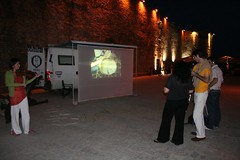
Finally a free day, or, at least a morning. Swimming in the sea and everyone having breakfast whenever they wanted. We have to prepare a presentation in the town of Budva for tonight, so everyone does what they do best. Our living room with the sea view is filled with more technology than people—computers, videocameras, recording gadgets, cables everywhere. We are working thru the footage we recorded in the past few days, so that we can publish it on the internet and show it tonight. We are leaving towards Budva, the old Venetian fort town, around 4pm.
Our event is not to be a „street performance“ for the consumption and entertainment of tourists, but we want to do a gentle „intervention“ which engages people, their creativity and their thinking about writing. We have an opportunity to learn that local Serbs have very strong feelings about the fact that the latinic script is slowly replacing cyrilic, and with the disappearing cyrilic, they feel their identity is being weakened too. It is confusing now to read some signs on the street. The pharmacy sign APTEKA, has an ambivalent reading—if you are used to reading in cyrilic, you get the nonsense reading „arteka“, only when reading in the latinic, the sign makes sense as „apteka“.
On the tourist leaflet advertising the Budva sights, there is no cyrilic text at all, even Serbian is transcribed in latinic. Sasha was quite irritated over the transcription of his great great grandfather’s name, Stefan Mitrov Ljubisha (who was an important historical figure and has a museum in Budva), into the latinic script, because cyrilic is much better suited to express its sound. This is at the core of the problem—latinic cannot express the sounds of letters properly.
Local TV documented our event and interviewed us and the participants.
Later in the evening we still had to find a working internet café to finally update our blog and upload pictures from the journey.
Sasha and Maja invited us to their house for a “Slavic
jam session.“ We sat on a terrace of a darkened house round a table with a late dinner, and deep below us the edge of the bay was outlined by street lights. The Slavic part of the jam session was a playful interlace of languages—Czech, Slovak, Serbian, Macedonian and occassional Russian—with Agnes‘ Hungarian violin.
No comments:
Post a Comment